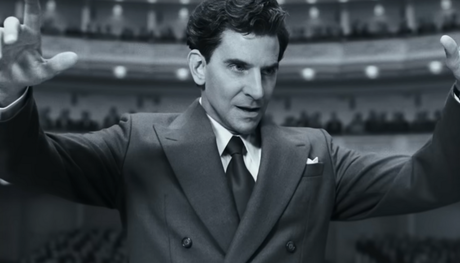
Young Lenny Bernstein (Bradley Cooper) at his Carnegie Hall debut, in 'Maestro' (2023)
Conducting One's Life in PublicWhat's this I'm watching? Lenny snorting cocaine? Lenny having affairs with young men? Lenny getting married, Lenny having children? The gala premieres, the boisterous nightlife, the concerts, the debuts, the banter, the repartee? Where's the "radical chic"?
In the new film Maestro, Bradley Cooper stars as the beloved American-born conductor, composer, and lively raconteur Leonard Bernstein, first as a young prodigy (in appearance, not so much), then in middle age (better), and finally at age 70 (best!). The gray hairs and wrinkles complete the overall picture.
At the start, Bernstein gets a 9:00 a.m. wakeup call to take over the Boston Symphony later that day from an indisposed Bruno Walter at Carnegie Hall. He's lying in bed with another man, so audiences are clued in right off the bat as to where this biopic is going: to Lenny's intimate, indiscreet side.
Not to mistake Lenny for Lenny Bruce, the foul-mouthed standup comic interpreted by Dustin Hoffman in Bob Fosse's 1974 film, the title of which has already been used. But "Lenny" as in Leonard (born Louis) Bernstein, our titular maestro. This Lenny made history in Carnegie Hall, leading the orchestra in Robert Schumann's "Manfred" Overture.
In the next sequence, he's with choreographer Jerome ("Jerry") Robbins working on the ballet Fancy Free, about three sailors on shore leave in New York City. The two are laboring over the score, spouting rapid-fire dialogue analogous to the work's free-flowing dance movements. So far, so good.
Bradley Cooper, who also directed, cowrote and produced the film, gets the manic nature of the man, that visceral, ever-vacillating disposition, and his high voltage personality, a veritable ball of fire, restless, urbane, full of pent-up energy and vigor. Lenny, his dynamic as well as his bombastic sides - all present and accounted for in his best scores.
As Cooper envisioned, Bernstein is a man possessed, one who pours every ounce of resources into his music and into his conducting duties, which blossomed after his history-making debut. Early on, lyricists Betty Comden (Mallory Portnoy) and Adolph Green (Nick Blaemire) are pictured entertaining the gang at a dinner party for theater folk.
Into this setting comes the lovely Felicia Montealegre (vulnerable Carrie Mulligan, well cast and deserving of an Oscar) of Chilean-Costa Rican-Jewish descent. Bernstein's talkative sister Shirley (a marvelously loquacious Sarah Silverman) is there, too. She introduces Felicia to her big brother Lenny. An equally incessant and lively chatterer, Lenny is shown chain-smoking and making small talk, the life of any party.
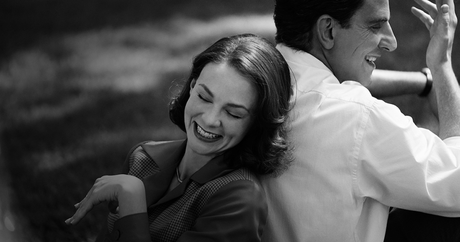
Scenes whizz by in haphazard fashion, the early portions of which are captured in high-contrast black and white, while subsequent episodes are imbued with a richer color palette. We witness the couple's first kiss. But already we feel the manifest tension present, the clash of iron wills: Bernstein trying to analyze Felicia and getting the basis for her lack of theatrical success all wrong. It's not "fear of success," as Lenny hints to her, but lack of luck.
No, it's not that either. Lenny compares his situation to that of fellow conductor Artur Rodziński moving in and Bruno Walter falling ill. Fate, one gathers, surely had a hand in Bernstein's success. But it hadn't rubbed off on Felicia. Still, both he and Felicia fall deeply in love and get deserved ovations for their respective performances. Unfortunately, Lenny misses his wife's last minute Broadway stage appearance which leads to increased friction between them.
In Cooper's vision, Bernstein is comparable to an electric light bulb gone wrong: You can't turn him off, since he's always turned on. He needs to be at the center of everyone's attention. For instance, we see Lenny with composer Aaron Copland (Brian Klugman), a fellow closeted gay man, who develop a lifelong friendship. But where are Samuel Barber and Gian Carlo Menotti? Oh, look, there's Serge Koussevitsky (Yasen Peyankov) giving some advice. One situation leads to another, when suddenly we're whisked to where Fancy Free is being rehearsed. "Not serious music," is someone's critical assessment.
Next, we see "Three Dance Variations" performed in a dream sequence that, if Cooper had viewed the Coen Brothers' farcical Hail, Caesar! (2016), would ring a bell with anyone over its "gay" thematic. Did this sequence really occur? Not likely. But even if it did, what does it have to do with Lenny the maestro, the first great American conductor of a major American orchestra; the never-at-a-loss for words, vivacious and ubiquitous homegrown talent, the concert and television personality?
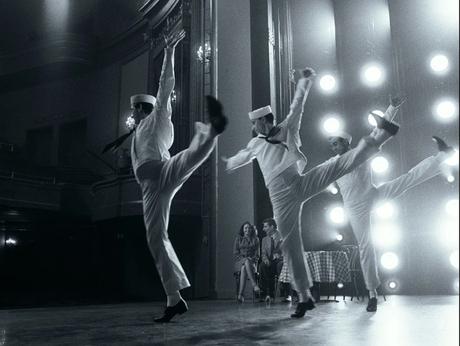
Dance sequence from 'Fancy Free' in Bradley Cooper's 'Maestro' (2023)
We hear the song "New York, New York," and indeed it is a wonderful town. We get it. Life and art will mesh, no doubt about it. They complement each other and ultimately blend together (as songwriter Cole Porter's "Friendship" once informed us) until one becomes inseparable from the other.
This leads viewers back to our couple, who decides to give marriage a whirl, even if Felicia confesses to Lenny that "she knows who he is." Meaning: She's on to his closeted lifestyle. Later, Lenny and Felicia, along with Jamie and Alexander Bernstein, their children, are interviewed by Edward R. Murrow at their apartment in Manhattan. There's talk of his turning Romeo and Juliet into a musical (the inevitable West Side Story), a film score for On the Waterfront, and the early TV program Omnibus, but also precious little context or insight into any of these productions. Where are the Young People's Concerts with the New York Philharmonic? Where is Bernstein's rabbinical obsession with having to explain anything and everything to everyone? You'll have to look elsewhere for them.
The formula is this: Bernstein as composer/conductor/creator versus Bernstein the performing artist. As a conductor = the public life; as a creative force = sitting alone in one's room. Viewers are treated to Lenny's intimate inner life instead of his much grander outer one. With his ever-present lighted cigarette in hand, puffing away, Lenny's life it seems goes up in smoke.
Now, about that "prosthetic nose" controversy: It's not as large or prominent an issue as the press has made it out to be. In fact, Bernstein's most evident physical characteristics, in this author's view, were his unusually large earlobes. As far as Bradley Cooper's interpretation is concerned, it both "is" and "isn't" Lenny. He does a better job of conveying the crustiness of the conductor's 70-year-old persona than he does with the younger, flashier dynamo.
As for Felicia, she sacrifices her professional life for a dual role as wife and mother to the maestro. There's lots of talk between them, some of it involving namedropping, most of it nonstop, fast-paced, rapid-fire staccato, furiously delivered - verbal hemorrhaging as my friend Gerald Thomas put it. In fact, the best scene in the movie concerns the couple's Thanksgiving Day quarrel, hurled at top speed in a stream of consciousness give-and-take of allegations, charges and countercharges, all at a literate level far above your standard husband-and-wife banter. The intellectual heft is breathtaking, to say the least.
We're also privy to bits and pieces of music associated with the maestro, i.e., the Adagietto from Mahler's 5 th Symphony; we have Bernstein's friendship with mentors Copland and Koussevitsky; and Lenny's gushing pride in his wife and young son.
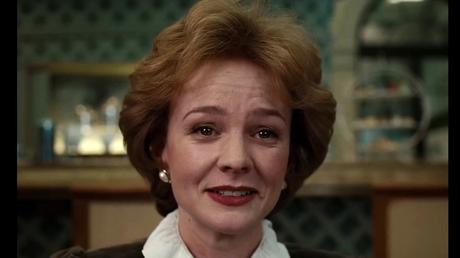
Carrie Mulligan as Felicia Montealegre in 'Maestro' (2023)
In the Mahler piece, we see Felicia's superimposed image, tiny in comparison and overshadowed (as it were) by Lenny's larger form. The thought is that she is losing her husband to his profession. That her career was dwarfed by his more towering one. About a third of the way in, we're treated to glorious color, the light and dark giving way to and replaced by luscious greens, yellows, blues, gold, aqua, and okra.
Cookie Cutter BoysBernstein struggles with concert appearances, and doing recordings when he should be composing. There goes the sex life again! At this stage, Bernstein's dalliances with handsome young males get to be a bit much, even for Felicia's endless patience. Interviews, discussions about his lack of creativity, one-on-ones with an author wanting to write a book about him or getting Lenny to write one - it's a losing battle.
Yet, where is the genius behind all this activity? It's all on the surface, the substance of which gets buried in avalanches of words, words, and more words that struggle to connect with viewers yet do little to help illustrate the conducting and compositional mind of the genius that was Lenny.
Lenny's compulsive work ethic is there, in spurts and in separate or related scenes, jumbled together and in between his encounters with interviewers and such - sort of a "file association" technique which must have been how the real-life Bernstein operated, in collaboration with the movie version.
Part of his struggle to be a composer was his overwhelming love for people, for being around and with them; his loathing of being left alone, forgotten and tossed to the side. But where was Bernstein's connection to Judaism and his Jewish heritage, his passion for Israel, his work with the New York Philharmonic, and his support for liberal causes, among them his controversial association with the Black Panther movement? Besides the above activities, what we are missing in Maestro is the context.
There's a scene of his rehearsing a chorus for Candide's "Make Our Garden Grow," a wonderful choice. Felicia looks on admiringly. Lenny is carried away, pouring his whole fiber into the piece, done a cappella. There's the Prelude to West Side Story played over a scene of Felicia in the park (in Massachusetts where the couple had their summer residence), with Lenny driving up in his pale blue convertible with another lover. Lenny waves to Felicia and embraces his youngest daughter by the poolside. But the perspective is off, it's all wrong, a non sequitur.
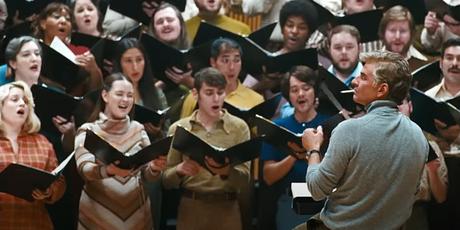
Felicia tries to get him to clear up the rumors to his daughter Jamie of his seeing other men. Lenny, for his part, is willing to spill the beans about his sexual proclivities, but Felicia insists he keep it to himself. "Don't you dare tell her the truth!" she emphasizes. And so, he doesn't. He is most convincing. Again, what is the connection to the main storyline? It's all random dialogue, arbitrary and without sufficient justification. But isn't life that way? One has to wonder.
In most films, music is used as a means to unify the action, to add clarity or substance to a work. But here, it beggars confusion amid silent shrugs of the shoulders, leaving audiences clueless as to what association a particular piece of music has to the action. Even to those familiar with Bernstein's life and accomplishments, the film seems to cast about for explanations where, to be perfectly honest, none exist. This is all to Maestro 's deficit - and it's a major one, next to the wandering screenplay (worked on by both Cooper and John Singer) that takes the viewer every which way except the path of coherence.
Lenny and Felicia argue about his bringing the young man Thomas to their summer home to meet the kids. Should Lenny have done that? And why is this important in telling Bernstein's overall story? Is this what Cooper and Singer labored so valiantly to bring to the screen? Could Steven Spielberg or Martin Scorsese have done a better job of it, or taken a different path? Both ended up as executive producers, and both had been penciled in to lead the project, prior to giving up the reins to Cooper.
Cooper, for his part, has directed, coproduced and cowritten a major motion picture that morphed into a passion project. Seeing Cooper on the CBS Sunday Morning program with the three surviving Bernstein children, Jamie, Alexander and Nina, one grasps the simple fact that he was emotionally attached and committed to capturing Lenny's intense but troubled relationship with Felicia, along with the conductor's family dynamic. You can see and feel the rapport he had with the adult siblings, it is that palpable.
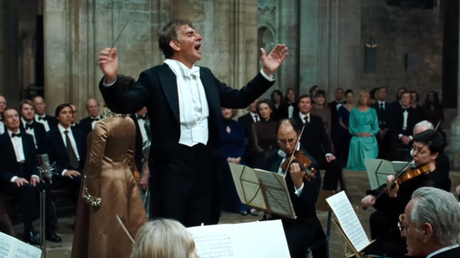
Given all the above, there's decidedly too much of the "man" and not nearly enough of the "artist." For instance, Mass was one of Bernstein's most accessible "serious" works and is given prominence later on, but audiences are left wondering as to the point of it all. As is the climax to Mahler's Symphony No. 2, subtitled the "Resurrection," the performance of which recaptures much of its inner fire and spiritual heft, but lacks the framework needed to provide clarity as to why this sequence matters for today's audiences. Yes, it's a magnificent effort but to what avail?
Gustav Mahler, an Austro-Bohemian Jew who converted to Catholicism later in life, lived in difficult times and experienced similar issues (as Bernstein surely had) between his art and religion, his troubled marriage to the lovely Alma Mahler, and his pursuit of a conducting career contrasted with his composing works of unimaginable emotional breadth and purpose. He could be the model for our modern-day Mahler, that is, our own Leonard Bernstein.
The last third of the film is taken up with Felicia's bout with and treatment of cancer, leading to her poignant passing (based on the surviving siblings' account). This segues briefly into Bernstein's teaching conducting classes to young aspirants, with his impulsive unruliness moderated somewhat for that final frame. For indeed, the remaining few minutes of Maestro return Leonard Bernstein to the beginning, where he is being interviewed about his life and work.
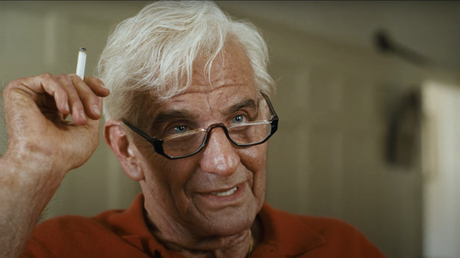
The older Leonard Bernstein (Bradley Cooper) in 'Maestro' (2023)
With that characteristic gleam and twinkle in his eyes and that wrinkled, wizened expression we know so well from his many television and concert appearances, a slightly irritated Lenny turns directly to the camera (but not to the audience) and asks, quizzically: "Any questions?"
Oh, yes! About several dozen or more! Only, we will never get the chance to ask them. One must look elsewhere for the answers.
Copyright © 2024 by Josmar F. Lopes
